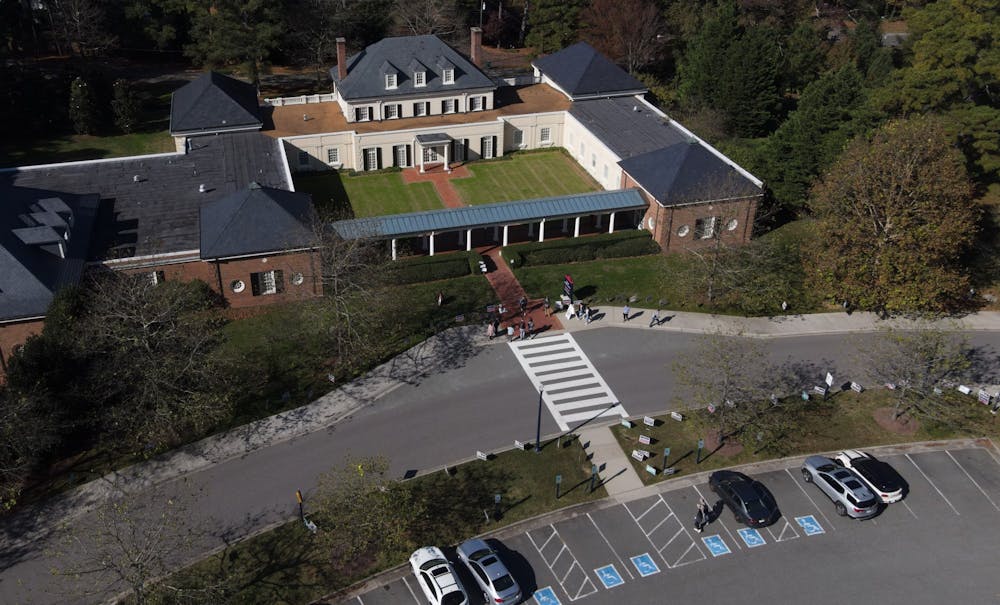The Bonner Center for Civic Engagement at the University of Richmond has been working to build excitement for students to register to vote and engage in policy ahead of Virginia's gubernatorial election.
Today, members of the CCE will start to see if their efforts have been a success.
With the help of student volunteers and CCE staff, Sasha Hollister, the assistant director of community relationships and place-based engagement at the CCE, has developed programs to encourage students to register to vote, create a voting plan for themselves and get to the polls on Election Day, Hollister said.
Hollister and her team held drop-in advising every weekday this fall to answer students’ voting-related questions, created an Uber code to provide students with transportation to off-campus polls and hosted a pizza party aimed at boosting enthusiasm around the election.
“[Students] get more excited when I tell them this is a really close race and [their] vote will have a real impact,” Hollister said.
Some students got involved in politics on campus by participating in the Oct. 26 debate between the UR College Democrats and the UR College Republicans, visiting lecturer of political science Anthony Sparacino said. The debate took on intense -- but critical -- issues, such as vaccine mandates and abortion laws, he said.
“I think it is definitely important that students get involved in these conversations,” Sparacino said. “From a practical standpoint, a lot of folks that are graduating are potentially going to be seeing some of this policy stuff manifest, depending on where they end up.”
Voting is a privilege, UR student and Virginia voter Victoria Galdamez said. Even though she does not always feel as though she has a voice in politics, Galdamez believes it is important to contribute to the legislative system, she said.
Similarly, UR law student Andrew Barber is voting in the election in an attempt to have a voice. However, his efforts have been in vain, he said.
“All of that ‘Get out and vote’ stuff that inspired me in last year’s election just isn’t happening this year,” Barber said.
The feeling that a person’s vote doesn’t matter is common, especially in recent elections, Sparacino said. But, he added, voting is an important responsibility.
“Participating in the process [of voting] is a noble endeavor,” Sparacino said.
Enjoy what you're reading?
Signup for our newsletter
Every vote counts, and young voters, in particular, can influence an election, Sparacino said.
Voter turnout in the 18- to 29-year-old demographic has been increasing rapidly in recent elections. In 2016, 39% of this demographic voted in the presidential election. In 2020, that number jumped to over 50%, Sparacino said.
Part of the reason for this rapid increase in young voters is their openness to alternative voting methods, Sparacino said. College students are extraordinarily interested in voting on election day, but also by mail, voting absentee and voting early in person, he said.
“It seems to be the case that [the college-] age demographic is embracing some of these sort of voting reforms that make access to voting easier,” Sparacino said.
To aid students in casting a ballot, the CCE posted a voting guide that covers topics ranging from important dates to who is on the ballot, including information about absentee voting, Hollister said.
On the guide, students will find UR Gov’s description of each position up for election and a description of each candidate in the Richmond city election. In Richmond, voters will be electing a governor, lieutenant governor, attorney general, house delegate and sheriff.
The major party candidates running for governor are Terry McAuliffe, a Democrat and former governor, and Glenn Youngkin, a Republican and former head of a global investment firm.
McAuliffe has attempted to tie Youngkin to former president Donald Trump, who has endorsed Youngkin. Youngkin has conversely called McAuliffe out for his policies, such as those on public education.
Also in the running is third-party candidate Princess Blanding, a Black activist and educator and founder of the Liberation Party. Blanding is advocating for Civil Rights legislation on the platform that she can relate to Virginia’s marginalized groups.
Another measure on the ballot is a referendum on whether to build a casino off of Interstate 95 in the Southside of Richmond, an issue which has been heavily debated in recent months.
“I’m interested to see when we get exit polls and to see why voters wound up voting the way that they did,” Sparacino said. “To what extent were they thinking about this in terms of national politics?”
In this close race, it is important that students get involved in whatever way they can, Hollister said. But first and foremost, everyone should cast a ballot, she said.
Students who have further questions about the election can contact Sasha Hollister at shollist@richmond.edu.
Contact contributor Leah Hincks at leah.hincks@richmond.edu.
Support independent student media
You can make a tax-deductible donation by clicking the button below, which takes you to our secure PayPal account. The page is set up to receive contributions in whatever amount you designate. We look forward to using the money we raise to further our mission of providing honest and accurate information to students, faculty, staff, alumni and others in the general public.
Donate Now



